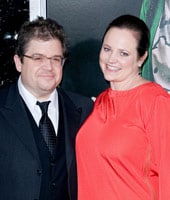Patton Oswalt calls out The Fat Jew for joke theft
Plagiarism and copyright infringement are strictly policed in most media industries, but, beyond the condemnation of other comedians and comedy writers, the theft of jokes is rarely met with punishment. That condemnation can carry a lot of weight in the world of stand-up comedy, though, as evidenced by Marc Maron’s two-part 2010 WTF podcast interview with Carlos Mencia and the comedians who claimed Mencia stole their material.
In the viral marketplace of social media, however, original sources mean very little. Jokes become financial game in which the most likes, favorites, retweets of the same material mean the biggest check–and the anger of other comedians seems to have very little impact.
One very angry other comedian is hoping to change that. A-lister Patton Oswalt has spent a large part of today calling out super-popular internet comedian (or “aggregator”) Josh “The Fat Jew” Ostrovsky for his continued disregard of sources–and for his outright theft of jokes.
Before we get to Patton’s tweets, though, I should share what set Oswalt off. The spark was a Facebook post written by Maura Quint with a link to a Hollywood Reporter article about The Fat Jew signing an exclusive representation deal with CAA. (The article was later updated to include a previous issue with The Fat Jew’s plagiarism of Davon Magwood.)
Here is Maura Quint’s original Facebook commentary–just click the link to view the original post to share via Facebook.
For those of you who don’t know, this guy, The Fat Jew is someone whose entire career is simply stealing jokes from tumblr, twitter, etc. He is making a living off of the hard work of other people. The people he steals from are struggling writers, comedians, etc. They would love to be able to profit from THEIR OWN WORK but can’t because this complete waste of a person is monetizing their words before they even have a chance to. When called out on his continued theft he either ignores it, says “whoops” or says “geez I guess an intern stole it!” This man makes nothing, contributes nothing, originates nothing, he is a leech, he is a virus, he is what is wrong with the world. Please please please do not support him. He is pure trash.
If you follow him on instagram, unfollow. If you follow him on twitter, unfollow. If you’re saying “but I like the stuff he puts out, it’s funny!” then just ask me and I’ll give you lists and lists of the originators of that content who are funny all the time with their own original words. You won’t miss this piece of sh!t, I promise.
Maura later screen capped the post and tweeted it. Here’s some of the conversation she had with people who reacted to it:
@_Shaney @pattonoswalt here’s the first 200 that came to mind, this list could be 1000, feel free to add https://t.co/ebh0yVAUaY
— (maura) (@behindyourback) August 15, 2015
Oswalt took the notion of an “aggregator” as a polished-up euphemism for “thief” as inspiration for a series of tweets. Here they are, along with some of Patton’s similarly themed retweets:
also, hilariously, when he steals jokes he always makes a really sh!tty second joke as the commentary pic.twitter.com/bfKGygWwjN
— Cohen is a ghost (@skullmandible) August 15, 2015
And our contributions:
@pattonoswalt “Good artists copy, great artists aggregate.” – Pablo Picasso
— Starcasm (@starcasm) August 15, 2015
@pattonoswalt My favorite Christmas movie is “How the Grinch Aggregated Christmas” #SameHair pic.twitter.com/bjYXrb230N
— Starcasm (@starcasm) August 15, 2015
For more information about The Fat Jew and his “aggregation,” enjoy these great reads:
“Everyone’s stealing jokes online. Why doesn’t anyone care?” – The Washington Post
Ostrovsk’s secret is a sort of joke laundering that divests a piece of content from its source. That can mean screen-shotting someone’s tweet and posting it to Instagram or Facebook, and sometimes, more egregiously, chopping off the originator’s name altogether. Consider this post, with almost 90,000 likes, in which he shared someone else’s Twitter joke (@undergroundbby’s, incidentally).
“FAT JEW STEALS JOKES [UPDATE: THE THEFT CONTINUES]” (From 2011) – Street Carnage
One of the more successful at this game is a brilliant jokester who calls himself Fat Jew. He’s basically the funniest guy on Twitter. Sh!t, he’s the funniest guy on the Internet. It’s like all his jokes represent the best Google has to offer. Oh wait, I just Googled some of his jokes. They’re the funniest thing on the Internet because they’re stolen from the Internet. Fat Jew is the Carlos Mencia of Twitter. What a tool.
“Why Stealing Jokes on Social Media is a Bigger Deal Than You Think” – Playboy
It’s interesting that if we were talking about a song, film, speech, or news report it would be obvious why plagiarism is a big deal, but in writing jokes the response is usually met with eye rolls. That’s mainly because there’s a big gray area as to what’s considered stealing. When thousands of people are throwing out a constant stream of jokes, there’s going to be some similarities and overlap. It’s inevitable. Let’s be clear: This isn’t about coincidences or parallel thinking. This is the popular, new trend of taking someone else’s joke, removing their name, and claiming it as your own.
Here’s an example from TheFatJewish, who has launched a career from taking credit for other’s jokes… [Click the above link for several samples.]
“3 Excuses Online Plagiarists Need to Stop Making” – Cracked
(This last one doesn’t mention The Fat Jew specifically, but it’s a great article about the problem — plus, it mentions Maura Quint’s oft-plagiarized @behindyourback Twitter account.)
Putting quotes around something with nothing more is bullshit, and his follow-up excuse that “it’s only Twitter” is also bullshit. Yes, the way your little sister or hacky uncle use Twitter is pointless. They tweet about long lines at the DMV or what they made for dinner. But having a successful Twitter account means something to comedic people. People have gotten book deals on the basis of their Twitter accounts alone. Other authors rely on a growing Twitter account sell their novels. Some comics try out jokes on Twitter, then later use them in their sets. Right or wrong, having a successful account can matter.
And if this is all really “just Twitter,” if these tweets are really of no value, then why would anyone be stealing them? Look at how many followers the Men’s Humor account has. Play a fun game. Cut and paste every single tweet of theirs into Twitter’s search option. See how many were stolen. Last time I checked, I got literally three in a row, all from accounts with tiny numbers of followers compared to their 3.4 million. And Twitter has verified the account, so you, the consumer, can be sure that it’s the REAL Men’s Humor stealing your comedy and creativity to build up their disgraceful feed. Trust me, they don’t think mere tweets are worthless.






